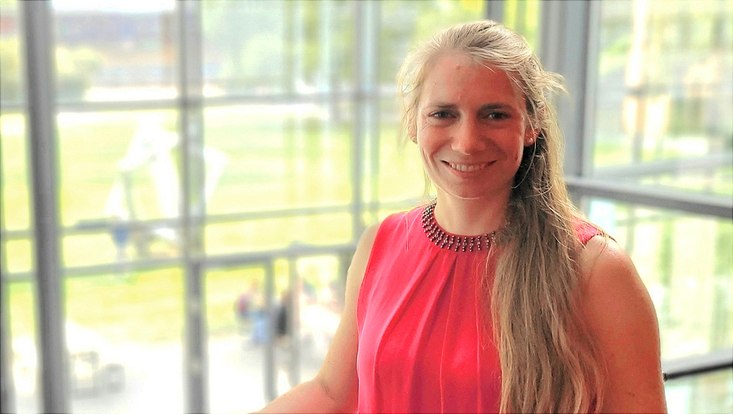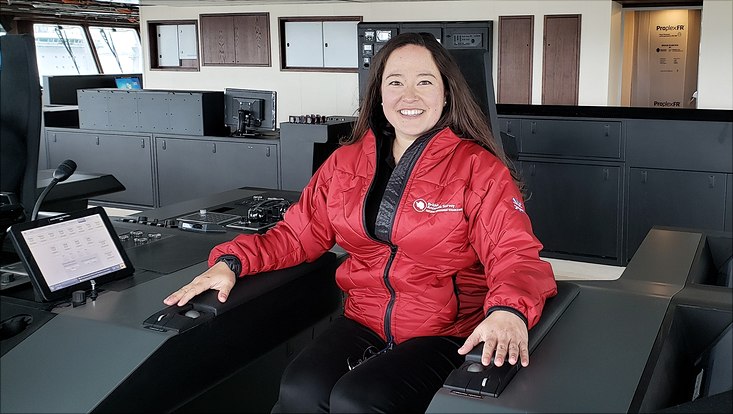“Welcome Aboard!”“The diversity of plant and fungus interaction never ceases to fascinate me.”Prof. Dr Dominik Begerow strengthens biosciences and is the new director of the Loki Schmidt Garden.
23 September 2022, by Begerow/Red.

Photo: UHH/Esfandiari
Every year, Universität Hamburg welcomes numerous new researchers. This series introduces them and their areas of research.
Prof. Dr. Dominik Begerow, previously at Ruhr-Universität Bochum, has been working at the Institute of Plant Science and Microbiology in the Faculty of Mathematics, Informatics and Natural Sciences since 1 August 2022. He is also the new director of the Loki Schmidt Garden.
My research area in brief:
My research focuses on fungi and their diverse interactions with plants. Plant parasites such as smut fungi depend on living host plants and in the course of evolution, they have developed a finely tuned infection mechanism that purposefully evades the plants’ own defense mechanisms. Using infection experiments and comparative genomics, we are trying to understand the mechanisms of the various species. To do so, we look especially at the processes of species development, hybridization, and co-evolution. For this, the focal program Taxon-Omics (SPP1991) will move from Bochum to Hamburg.
We are also interested in the interaction between entire fungal communities and plants—at the root, on the leaves, or in the nectar and blossoms—that we characterize using meta-barcoding approaches. This makes it increasingly clear that the plant microbiome can have a huge impact on the entire ecosystem. In Hamburg, we would especially like to analyze the role of fungal communities with regard to climate change.
I explain what I do to my friends and family as follows:
Over time, organisms change and become more or less common due to positive or negative features. It is not simply environmental factors such as temperature and precipitation that play a role, but also the interactions between species. For example, plant parasites can lead to plants producing less energy through photosynthesis and they also drain the plants of their energy. This is why plants defend themselves against parasites, but these are usually quicker and adapt to the defense mechanisms. We are now studying the genetic code of parasites and comparing their adaptations to on another. This teaches us the parasites’ successful strategies and perhaps, in the future, we will understand how we can prepare the plants for possible changes.
Using modern genetic methods, we can even analyze hundreds of different fungus species in a small habitat, for example, a leaf, and thus be able quickly to say something about changes due to environmental factors. For example, we could recently show that in different places in German forests, there are very different species. But when we look at what the fungi do in their respective locations, we see that in comparable forests, different fungi do exactly the same thing or the same enzymes are active. This redundancy is probably especially significant for being able to respond to climate change and to ameliorate possible negative effects.
In Hamburg, the city and the University, I am looking forward to:
I am especially looking forward to my new colleagues in Hamburg. There will certainly be opportunities for cooperation that combine our research interests. I am equally happy about my new responsibilities as the director of the Loki Schmidt Garden. There are also a lot of colleagues here with whom I’d like to further develop the garden to make the significance of the plants for the future of our planet more visible.
These are my plans at Universität Hamburg:
In addition to research projects, I want above all to give the Loki Schmidt Garden a clear profile and to strengthen its importance for the University and Hamburg. Thanks to the industriousness of the staff, the garden is in fantastic condition. Together with the gardeners, I would like to better showcase Hamburg’s botanic collections because I am convinced that plant diversity is a central building block towards solving society’s future problems. The focus on useful plants, which has a long tradition here and, thanks to the Loki Schmidt House—Museum for Economic Plants is especially at home here, is something I am committed to. We are not only dependent on plants for food; they will also play a larger role in medicine and biotechnology in the future. We want to bring that home to our colleagues, students, and the entire Hamburg public.
This is why students should come to my lectures:
The name of my department, Organismic Botany and Mycology, makes clear that I will be focusing on the neglected group of fungi. In school and university curricula, they often play only a small role and yet they are endlessly important for our ecosystems. They are ubiquitous and play a central role in the decay of organic material. I invite my students in my classes to get to know these organisms better so that we can strengthen fungi research and better tap it in the future. Indeed, fungi are so special because there is still so much to discover: new species, new organelles, new agents, new metabolic pathways ... Genuine, curious explorers are always welcome.
Reaching out to the world: I work with the following international and federal institutions and universities:
As a long-standing member of the executive board of the International Mycological Association, I am internationally connected as a researcher. We actively exchange with researchers from France, the United States, South Africa, Bulgaria, the Netherlands, Belgium, China, Ecuador, Portugal, and other countries. International colleagues regularly visit and many of our final theses or doctoral dissertations are completed, in part, in other countries.
My research is important to society, to help resolve the following issues:
Even if we primarily do research on the principles of the evolution and ecology of fungi-plant interactions, many application aspects motivate our research. Climate change increasingly threatens our basic food resource and there has been essentially no research on the behavior of parasites and other interacting partners. When we better understand how microorganisms such as bacteria and fungi deal with changes and how they respond to them, perhaps we can develop sustainable solutions that do not lead to more problems.


